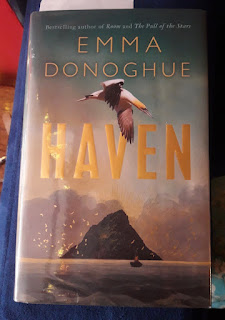"Cormac spots the Prior coming towards them, bloodied on head and hands. Has he had a fall?
They jump to their feet and make their bows.
But the Prior's unhurt, and exhilarated. He drops a great dead bird on the turf and steps up close to mark Cormac's forehead, then Trian's, with its warm blood. 'The blessing of Christ on you.'
'Amen, Father.'
'Amen.'
The Prior takes the jar of soap and the goatskin of water, to wash his hands.
Cormac hopes their master doesn't use up too much of their drinking water, but doesn't dare say so.
Then the Prior rings the bell for Terce.
After the service, they share the browned oatcakes, and the Prior tells Cormac to put the great auk on to roast. 'Fat and flightless - could we have more plentiful or easy prey?'
The notion seems to make Trian uneasy. 'We shouldn't take more than we need, surely Father?'
The Prior looks at him, one eyebrow tilted. 'What else are they for?'
'I only mean ... they were here long before us.'
He corrects Trian: 'Ready for our arrival. This whole island's like one great banquet table that God's spread for us.' " (p. 106-7)


'Go Set a Watchman' by Harper Lee I have to confess underwhelmed me. It felt as if she was just so fond of the character of Scout that she wanted to see what became of her. The issues it raises as Jean Lousie returns to her home town and reenters a community with the perspective of something of an outsider make for some uncomfortable reading. Written in the 50s and set some 20 years after Kill a Mockingbird it looks again at the issue of racism within the United States. The local community is resistant to desegregation and she comes to understand the prevailing attitude is shared by both her father and her potential future husband. She undergoes a bit of a crisis in learning that her father is not the paragon of virtue she had always imagined him to be. I am not sure it had anything very enlightening to add to the debate and I was left uneasy by the resolution of her crisis. The story's presentation of the NAACP (National Association for the Advancement of Coloured People) is very negative, accusing it of causing the distrust and unrest by pushing for desegregation against the will of the white majority. I don't know much about the structure of government in the US but it felt to me like they were covering up the racism with a blanket of constitutionalism, defending the state's right to decide their own laws (the 10th amendment apparently) and resisting the Supreme Court's decision that segregated schools were unconstitutional. Here Jean Louise debates with Atticus (at length):
"I'm trying to say that I don't approve of the way they did it, that it scares me to death when i think about the way they did it, but they had to do it. It was put under their noses and they had to do it. Atticus, the time has come when we've got to do right - '
'Do right?'
'Yes sir. Give'em a chance.'
'The Negroes? You don't think they have a chance?'
'Why, no sir.'
'What's to prevent any Negro from going where he pleases in they country and finding what he wants?'
'That's a loaded question and you know it, for! I' so sick of this moral double-dealing I could - '
He had stung her, and she had shown him she felt it. But she could not help herself.
Her father picked up a pencil and tapped it on his desk. 'Jean Louise,' he said. 'Have you ever considered that you can't have a set of backward people living among people advanced in one kind of civilisation and have a social Arcadia?'
'You're queering the pitch on me, Atticus, so lets keep the sociology out of it for a second. Of course I know that, but I heard something once. I heard a slogan and it stuck in my head. I heard 'Equal rights for all; special privileges for none,' and to me it didn't mean anything but what it said. It didn't mean one card off the top of the stack for the white man and one off the bottom for the Negro, it -' " (p.241-2)
They go on to discuss whether 'backwards' people have a right to be citizens and voters and as you read your brain explodes and you think, have these people not heard of structural racism?? and of course they hadn't. What's most depressing is that you can't even make some glib comment that things have gotten better ... because mostly they haven't.
Stay safe. Be kind. Consider the small ways in which things might have gotten better.

No comments:
Post a Comment
Thanks for stopping by. Thoughts, opinions and suggestions (reading or otherwise) always most welcome.